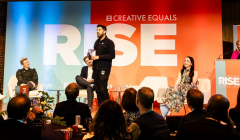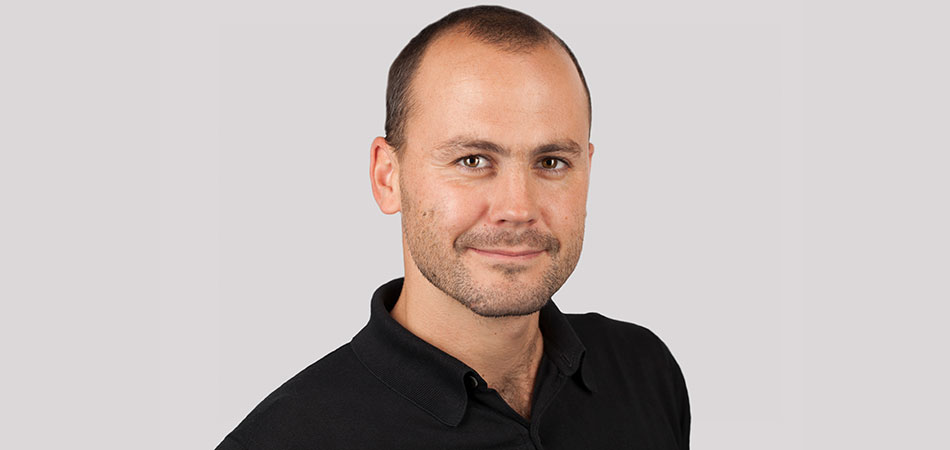
Are we leaving men and boys behind?
At Creative Equal’s RISE event, industry leaders consider how to reframe boys and men in marketing
CEO, 360i


Career to date:
2015, CEO, 360i
2013, Managing Director, Fallon London
2010, Head of Account Management, Fallon London
2002, Client Services Director, exposure London
James Townsend: My job is to create an environment where the people, the clients businesses and our collective projects can realise their full potential by continually improving.
And then as part of the Dentsu Aegis Network, it’s to ensure that we are contributing to and taking advantage of the benefits of being part of this excellent network, making sure that we feel like we’re creating a sense of self but also that we’re part of a connected family.
James Townsend: I started at a wonderful company called Exposure, an integrated business with lifestyle PR, events and digital. I ended up sitting in the middle, trying to grab different parts of the constituent capabilities we had and turn them into integrated solutions and campaigns for clients. They gave me a lot of free reign and we worked on some lovely businesses like Red Bull and Nike.
I had a great time there but wanted to be more at the top table, helping brands and businesses, more architecture than execution. So, I joined an agency called Fallon, a creative, advertising agency. I wanted to learn about big brand planning, creative thinking and execution. I spent five years there and ended up being their MD for three of those years.
After five roller-coaster years there learning my creative education, I joined 360i because I loved the idea of a digital economy business that had context, creative and distribution. Data-driven context, modern digital creativity and the ability to distribute that, and those constituent parts playing back into each other to help make the work better.
“In a measurable world there's an opportunity for us to get paid commensurably and to become a more meritocratic industry. That will mean the best people, the best agencies rise to the top because their ideas will be paid for at their value."
James Townsend: The breadth of our diversity. We have mathematicians, data scientists and engineers in our analytics department bumping into conceptual creative people, bumping into technical people. The trick is if we can find a way to help them see the benefit of each other and see the difference as opportunity. Between those points are where the best answers for clients lie.
Our positioning here is data driven creativity, but our purpose is make tomorrow better than today. It’s a very volatile, unpredictable world so our answer to market is perpetual improvement for our people, partners and projects.
James Townsend: We did a fun piece of work for Lidl at Christmas which was a Facebook first. We did an AR filter and launched that with Brian Blessed. We gave people the opportunity to turn themselves into a brussels sprout or a turkey and then share that. It got nearly half a million shares and 4 million engagements. It was a nice mix of innovative creative tech. That’s where our media strength helped us because we could distribute it intelligently rather than hope for virality.
On a more sober note, we did a piece of work for CALM last year, around trying to confront the role that social media plays in young men’s lives. We put a piece of work out through Instagram which was an iconic shot of a guy looking fantastic and happy and then a really hard-hitting fact about the fact that that person then took their own life or suffered severe mental health issues. We wanted to try and use social media to confront a social media problem, a societal, cultural problem.
Those are either end of the scale. One’s quite fun and frivolous and about engagement and populist. And one’s more about trying to make a cultural comment and contribute in that way.
James Townsend: If you look at the Me Too movement, whilst not a marketing campaign in the traditional sense, if you look at the mechanics of how that’s come to bear, it’s incredibly personal and intimate experiences told in an incredibly public way. There’s lessons to be learned there in terms of how that travelled and gained traction.
But then conversely Super Bowl recently, a lot of the body of work was incredibly light hearted and frivolous against a backdrop of the macro economics of the world, which at the moment are very heavy, lots of concern, worried communities. The marketing community’s answer to that was to provide some levity. It pushed against the current tide. Unbridled entertainment versus heavy comment.
James Townsend: DAVID in Miami are doing some excellent work. We work with Burger King here in the UK and so we have some sight of that. What you see is an agency that’s incredibly attuned to culture. What’s interesting about what they’re doing with Burger King is their speed to market and the way in which they’re working. We admire that in terms of the ability to come up with a cultural comment and distribute it in a modern, innovative way. The Global CMO’s brief to us when we came onto the business was they want billion impression ideas. That tells you everything you need to know.
DAVID have done brilliant advertising delivered in a modern, digital way, done very quickly and without too much infrastructure. Their projects were relevant in the media at the time, so they got it out there at that point rather than being late to the party which is where we sometimes fail as a market and as an industry.
“Less focus on the extact final answer of your creative idea...It gives you a chance to build a genuinely credible relationship because the how leads to the what. If we get how we work right and how we interact together, we'll probably make some compelling work together."
James Townsend: The change in our business model will result in better output. You’re going to see more cause and effect-based remuneration. Agencies that win will come up with more innovative ways of getting paid for their actual value. There will also be greater transparency in how money is made so the idea of big mark-ups will dissipate. Those two factors will result in agencies having to come up with more credible solutions that are more valuable for clients.
In a measurable world there’s an opportunity for us to get paid commensurably and to become a more meritocratic industry. That will mean the best people, the best agencies rise to the top because their ideas will be paid for at their value because they’re effective, they work, they drive whatever metric they need to drive.
James Townsend: I want us to help people involved in our business realise their potential, develop more and more interesting ways of working and the output and results from that, and then contribute to the Dentsu Aegis Network in an ever more important way.
James Townsend: Massively, we do see it changing. Fewer shootouts, fewer big reveals and more and more collaborative working processes where clients get a chance to see how we work. What we’re seeing is that your method is becoming as important as your output at pitch stage, so being able to see the tools that you use, how you use them, how you choreograph your people, how quickly and agile you come to ideas and solutions.
Less focus on the exact final answer of your creative idea and more about the way that you come to it as a way of illustrating how you work. It gives you a chance to build a genuinely credible relationship because the how leads to the what. If we get how we work right and how we interact together, we’ll probably make some compelling work together.
Increasingly, we’re trying to subvert pitch processes. We make no apology for that.
James Townsend: People that are productively pushing against the status quo. There are a lot of people disrupting the status quo but not always productively. And there’s a lot of people capitalising on that disruption and not always in the healthiest way that contributes. Elon Musk is making an assertion and then delivering on something that looks like a world without any diesel cars. That’s productive disruption.
Your behaviour and moral compass is ever more prevalent in a transparent world. A company we work with here is a small mobile phone network called TPO, The People’s Operator. Their proposition is they won’t advertise, and they’ll give 10% of your bill to a charity of your choice. They want to run their business in a clever, efficient way and then give the consumer the power to have a broader impact on the world around them. Purpose driven marketing seems to be here to stay. That’s a really good thing.
The trend that we’re focused on is the idea that customers want to know more about the social, economic and environmental impact of brands. How do you evaluate that in the brands you work with?
Our growth strategy in terms of new business is to work with clients who are progressive or know they need to be.
We don’t want to work in the middle of the market and maintain anything. We want to help propel and change businesses. And that would extend into some of the more personal, emotional, ethical choices and that is entirely up to the team. I have my own personal views but it’s about the people in this business making that decision. When we have an opportunity with a client in a sector that might raise those questions, we ask everyone.
In some of those key decisions, we don’t want a bunch of people working on a pitch for a business they have no passion or interest or in fact are anti it. That makes no sense for us commercially, quite apart from our people being in an environment where they’re set up to realise their potential.
Looks like you need to create a Creativebrief account to perform this action.
Create account Sign inLooks like you need to create a Creativebrief account to perform this action.
Create account Sign in